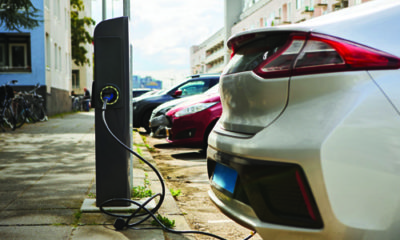News
Govt, industry must join hands to make 2022 the year of EVs


Source:https://evcd.in/govt-industry-must-join-hands-to-make-2022-the-year-of-evs/
Electric vehicles market witnessed a huge traction in the outgoing year because of a variety of factors. The sales grew exponentially and people became more conscious of the benefits accruing from EV switchover. However, price and range are still the major deterrents for budget-conscious Indians and the Government and the industry must work together on these fronts to make 2022 a revolutionary year for e-mobility.
The year 2021 has been highly significant for the electric vehicles market in the country. From the policies and subsidies offered by the Central Government to multiple benefits rolled out by various state governments, the year turned out to be phenomenal in terms of EV sales. The automotive industry will do well to treat it as a ‘proof of concept’ and consider investing more in Research and Development (R&D) related to of EVs.
The electric two-wheeler and three-wheeler markets, particularly, witnessed an exponential growth in the outgoing year. Four-wheeler EVs too saw a rise in sales, but not as huge as in the case of the former. The obvious reason for this was high prices of four-wheeler EVs and availability of limited options. The majority of sales in the four-wheeler EV segment were garnered by Tata Nexon, MG ZS and Hyundai Kona.
- The automotive industry will do well to treat it as a ‘proof of concept’ and consider investing more in Research and Development (R&D) related to of EVs.
- While Tata Motors plans to launch 10 EVs by 2026, Hyundai has announced that it will launch six EVs by 2028, starting with the most-hyped Ioniq 5.
- Looking at the sales pattern of the EV market in the country, one can make out that the price-point remains a crucial factor.
Keeping various factors in mind, 2022 is expected to prove a watershed year for the EV industry. Most of the major brands have big EV plans for the upcoming year, and the years beyond. While Tata Motors plans to launch at least 10 EVs by the year 2026, Hyundai has announced that it will launch six EVs by 2028, starting with the most-hyped Ioniq 5. MG Motors and and Kia India have also proclaimed to expand their EV portfolio in the next five years. Luxury car brands like BMW, Audi, and Merced have launched their flagship EVs in December 2021 and have major plans for the next few years.
Looking at the sales pattern of the EV market in the country, one can make out that the price-point remains a crucial factor. Since EVs are generally not the primary vehicle of a consumer, price becomes the key in its purchase decision.
Presently, the most affordable four-wheel EV available in the market is priced at Rs 15 lakh, which is rather expensive by Indian standards. A major of electric cars are way over the Rs 25-lakh mark.
Even though most people are conscious of the benefits of using an EV for the sake of environment and are also aware that the running cost of these vehicles is far less than that of a petrol/diesel-run vehicle, they are hesitant of making a switchover as the price of an EV remains a deterrent. What they are essentially looking for is an affordable EV with longer range. It becomes incumbent, therefore, upon the Government and the automotive industry to work together and provide the consumers with a more affordable portfolio of EVs with higher range so as to make 2022 a turning point in the EV revolution.
-



 News3 weeks ago
News3 weeks agoKW Delhi 6 Mall Onboards New Brands
-



 News4 weeks ago
News4 weeks agoManasum Senior Living Launches IKIGAI GOA, A Senior Living Community in North Goa, in collaboration with Prescon Homes
-



 News2 weeks ago
News2 weeks agoGodrej Properties Sells Rs 3k cr+ Homes of Godrej Zenith, Gurugram, within 3 days
-



 News4 weeks ago
News4 weeks agoBridging India Divide: Top 5 Tier- 2 Cities to Focus On
-



 News3 weeks ago
News3 weeks agoCommercial Realty Gets Tech Savvy: Fast Construction, Enhanced Convenience
-



 News4 weeks ago
News4 weeks agoMultipoint Connection – A Definite Boon
-



 News3 weeks ago
News3 weeks agoRBI’s Status Quo on Key Policy Rates to Help Maintain the Real Estate Growth Momentum, Say Industry Stalwarts
-



 News1 week ago
News1 week agoOlive Announces Dhruv Kalro as Co-Founder





























